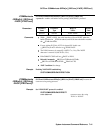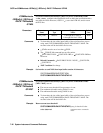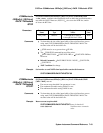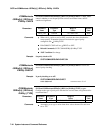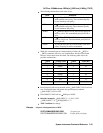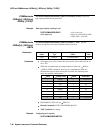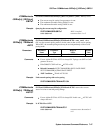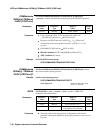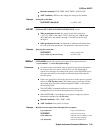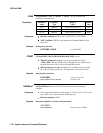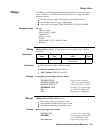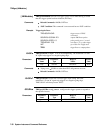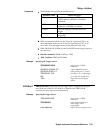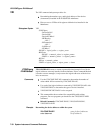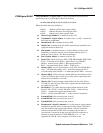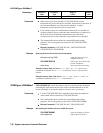
• Related Commands: SYST:TIME, SYST:TIME?, SYST:DATE?
• *RST Condition: *RST does not change the setting of the calendar.
Example Setting the system Date
SYST:DATE 1991,09,08 set SEP 8, 1991
:DATE? SYSTem:DATE? [ MIN| MAX,MIN| MAX,MIN| MAX] returns:
• When no parameter is sent: the current system date in the form
+ YYYY,+ MM,+ DD, where YYYY can be the year 1980 through
2079, MM can be the month 1 through 12, and DD can be the day 1
through 31.
• When parameters are sent: the minimum or maximum allowable values
for each of the three parameters. The parameter count must be three.
Example Querying the system date
SYST:DATE? ask for current date
input values of year,month,day read back date
:ERRor? SYSTem:ERR? queries the system’s error queue. The response format is:
< error number> ,"< error description string> ".
Comments • As system errors are detected, they are placed in the System Instrument
error queue. The error queue is first in, first out. This means that if
several error messages are waiting in the queue, each SYST:ERR? query
will return the oldest error message, and that message will be deleted
from the queue.
• If the error queue fills to 30 entries, the last error in the queue is replaced
with error -350,"Too may errors". No further errors are accepted by the
queue until space becomes available using SYST:ERR?, or the queue is
cleared using *CLS.
• The SYST:ERR? command can be used to determine if any
configuration errors occurred during the power-on sequence.
• When SYST:ERR? is sent while the error queue is empty, the System
Instrument responds with + 0,"No error".
• Related Commands: *ESE, *ESR?, *SRE
• *RST Condition: Error queue is cleared
Example Read all error messages from, and empty the error queue.
loop statement loop to read all errors
SYST:ERR? ask for error m essage
enter statement input the error (a num ber), and
error m essage (a string)
until statement until error number is 0
SYSTem :DATE?
System Instrument Command Reference 7-49



